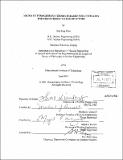Micro-heterogeneous thorium based fuel concepts for pressurized water reactions
Author(s)
Zhao, Xianfeng, 1971-
DownloadFull printable version (15.82Mb)
Other Contributors
Massachusetts Institute of Technology. Dept. of Nuclear Engineering.
Advisor
Michael J. Driscoll.
Terms of use
Metadata
Show full item recordAbstract
The purpose of this work is to evaluate the potential for enhancing the performance of the once-through PWR fuel cycle by appropriate design of thorium containing fuel with concurrent consideration of neutronics, thermal-hydraulics, and proliferation resistance. CASMO-4 is employed to model a fuel assembly consisting of a homogeneously fueled ThO2-UO2 lattice of conventional design. It is found that homogeneously mixed ThO2-UO2 fuel in general has better physics behavior than all-UO2 fuel, e.g. more negative MTC and less reactivity swing. The H/HM ratio can be optimized to extend the burnup of both ThO2-UO2 and all-UO2 fuel about 10% and 5% respectively. However, it is found that the all-UO2 fuel provides higher potential energy generation (or achievable burnup) than the homogeneously mixed ThO2-UO2 fuel. MOCUP (MCNP+ORIGEN) is used to model unit cells of the micro-heterogeneous fuel. The key findings for the best micro-heterogeneous configurations are as follows: (1) For a given U-235 inventory, a 20% to 30% increase in fuel cycle achievable bumup above the homogeneous case is possible, therefore 10% to 15% above the all-UO2 fuel; (2) For certain axially heterogeneous configurations, a "burnable poison" reactivity suppression effect appears at the beginning of irradiation. Analysis of the possible mechanisms behind these effects shows that they are due to a combination of changes in self-shielding, local fissile worth, and conversion ratio. (cont.) Economic evaluations show that the homogeneous ThO2-UO2 fuel is 20%-30% more expensive than the equivalent all-U fuel but micro-heterogeneous fuel can be comparable to or even cheaper than the all-UO2 fuel. In terms of the plutonium content, the micro-heterogeneous Th/U fuel is more proliferation-resistant than the homogeneous Th/U fuel, and the homogeneous Th/U fuel is more proliferation-resistant than the all-UO2 fuel. However, the uranium produced in the ThO2 zone of any undenatured micro-heterogeneous design should be considered of proliferative concern. Adding natural or depleted uranium to the ThO2 zone can make the material not weapon-usable at the expense of degrading the neutronic performance. Placing some enriched uranium within the thorium zone may be needed to reduce local thermal peaking to a manageable level.
Description
Thesis (Ph. D.)--Massachusetts Institute of Technology, Dept. of Nuclear Engineering, 2001. Includes bibliographical references (p. 139-143).
Date issued
2001Department
Massachusetts Institute of Technology. Department of Nuclear Engineering; Massachusetts Institute of Technology. Department of Nuclear Science and EngineeringPublisher
Massachusetts Institute of Technology
Keywords
Nuclear Engineering.